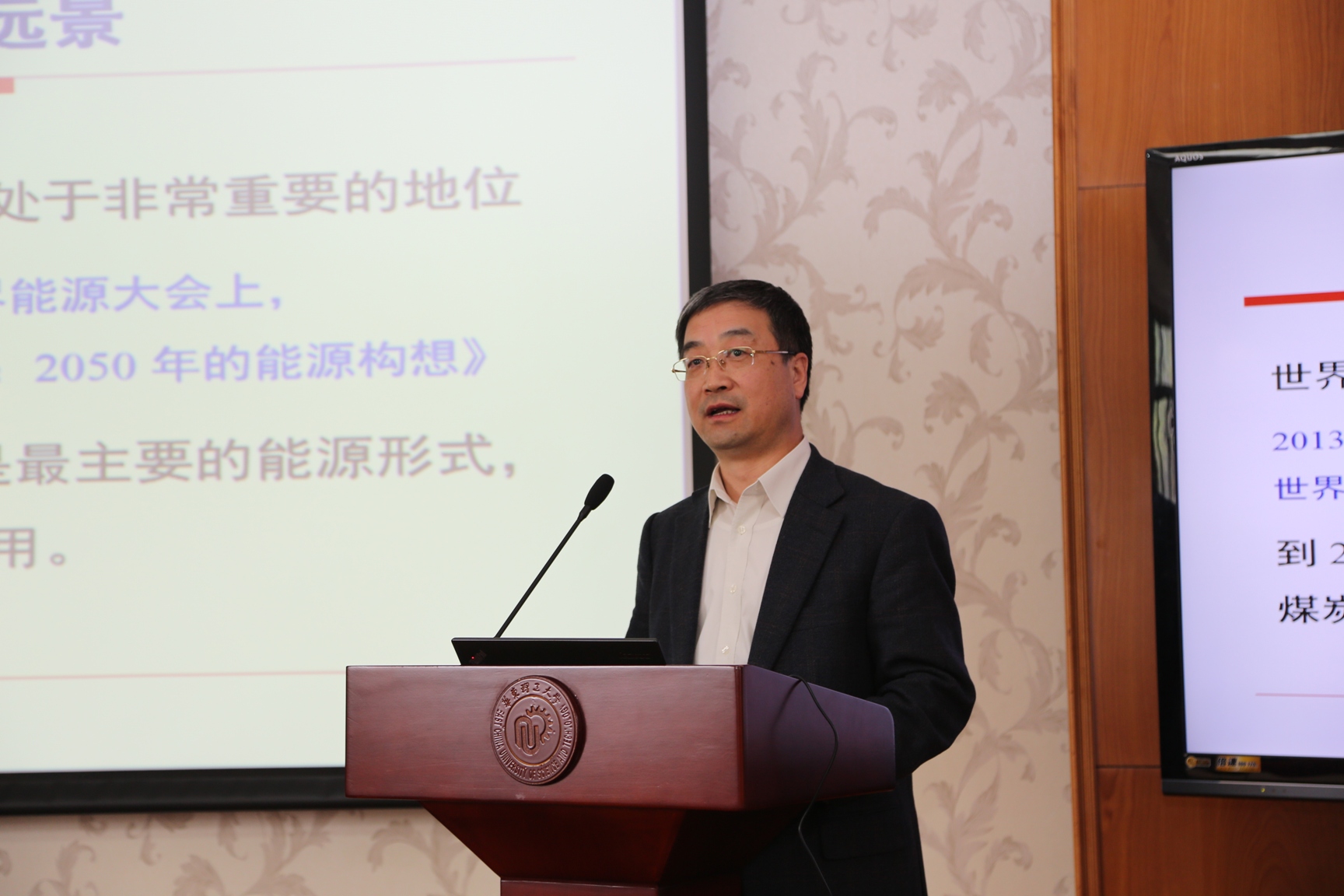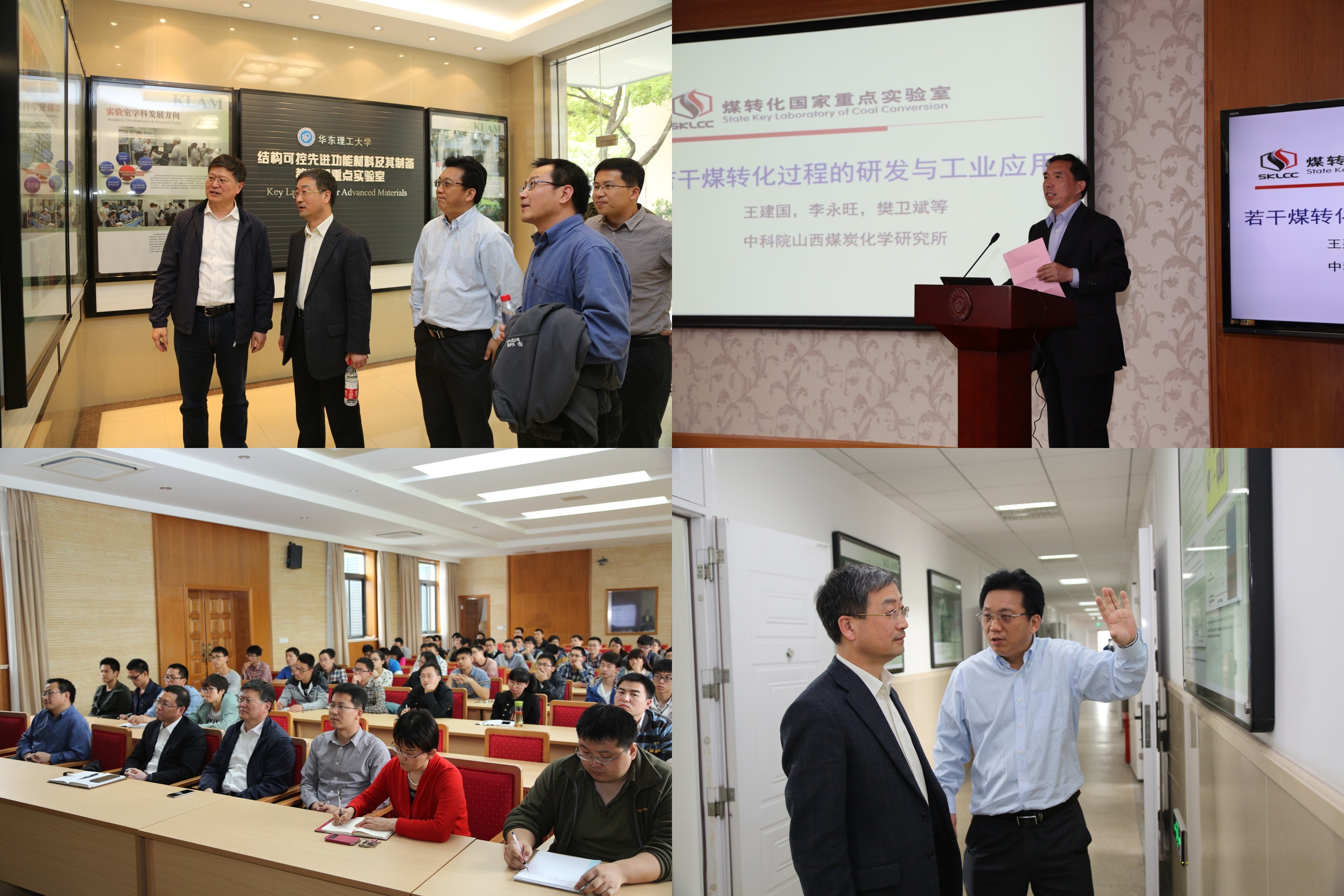On April 24th, invited by Prof. Tian He and Prof. Wang Fuchen (Collaborative Innovation Center for Coal Based Energy), Prof. Wang Jianguo (the chief scientist of 973 project, director of the Institute of Coal Chemistry) visited our school. Prof. Wang attended the 147th "Famous Teacher Forum" and gave a lecture titled "Several research and industrial applications of coal conversion processes". Prof. Wang Fuchen hosted the lecture and Prof. Tian He, Liu Haifeng, Zhu Weihong, Zhu Linyong, Wang Yanqin also attended the lecture.

In the lecture, Prof. Wang pointed out that coal occupied a very important and long-term position in the world energy structure, especially in China's energy situation. Coal-dominated energy structure will not change in the future for a long time. As is known to all, coal was a kind of low-grade energy, the use process of it had brought a series of ecological, environmental issues, so how to use coal more clean and efficient was particularly important. In that case, coal conversion and utilization was an important direction, which was suit with China's national conditions. In other words, it will greatly guarantee security of supply of oil and gas, and promote energy restructuring.

Prof. Wang also described the process of coal conversion, which included direct conversion and indirect conversion. Direct conversion of coal was convert coal into oil and chemicals by catalytic hydrogenation under high temperature and high pressure. The indirect conversion of coal was converted gas into CO and H2, and then transformed into liquid fuels and chemicals in the role of catalyst. Coal conversion process was a big system, which invested extremely high and the product is very rich at the same time. Coal conversion was based on one carbon chemistry and catalysis chemistry, so the research of it must carry out analysis of thermodynamics, kinetics and reaction engineering at the same time, combined experimental research with theoretical calculation, promoted research and development of key technologies by basic research. After the lecture, Prof. Wang discussed with participants and exchanged opinions.
Prof. Wang also visited the Key Laboratory for Advanced Materials. Prof. Tian made a detailed introduction of the construction, development of the Key Lab. After the visit, the young teachers of our school, including Zhu Weihong, Zhu Linyong, Guo Zhiqian, Ma Xiang, respectively made summary reports to Prof. Wang together with one-on-one guidances from him. Prof. Wang gave some valuable suggestions on their work. The participant stated that they benefited a lot from the guidance from Prof. Wang, who pointed out the direction for their future sustainable development.
CV of Prof. Wang Jianguo:
Prof. Wang Jianguo, research professor and doctoral supervisor, was born in 1962. He obtained both his bachelor’s degree and master’s degree at Lanzhou University respectively in 1985 and 1988, majoring in physical chemistry. He worked at Taiyuan University of Technology as a teacher from 1988 to 1991. He was admitted to the Institute of Coal Chemistry (ICC), Chinese Academy of Sciences (CAS), as a Ph.D candidate in 1991 and received his Ph.D degree in 1995. In 1996, he was awarded with an Alexander von Humboldt fellowship and worked in the Institute of Technical Chemistry I, University of Erlangen-Nuremberg, Germany, studying the shape selective reactions on zeolites by both continuum and Monte Carlo simulations. He joined ICC in 1998 and was selected into the Hundred Talents Project by CAS in 2000. He took the vice directorship of State Key Laboratory of Coal Conversion in 2000 and the directorship in 2004. He was appointed vice director of ICC in 2004 and then the director in 2008. He was member of the 9th, 10th, 11th specialist appraisal panel of the National Natural Science Foundation of China. He is the deputy editor-in-chief of Journal of Fuel Chemistry and member of editorial board of Journal of Catalysis and Coal Conversion. He is also part-time professor and doctoral supervisor of Lanzhou University. He has published 105 papers on international academic journals including J. Phys. Chem., J. Catal., Ind. Eng. Chem. Res., Chem. Eng. Sci., Appl. Catal., Surf. Sci., etc, and has got 8 authorized patents. He won two second Shanxi Science and Technology Awards respectively in 2004 and 2006. His main research field is experiment and theory of catalysts and reaction processes for synthesis and conversion of hydrocarbon and alcohol.





